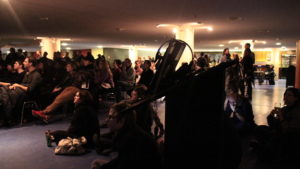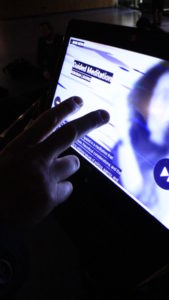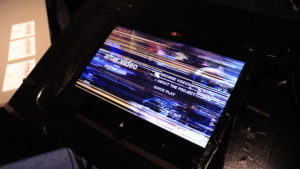We held a reception for our soon to be published video book: after.video at the Transmediale Festival.
Seeing Power—What About That?
with: 2/5BZ + after.video collective
Reception/Presentation + Performance
Sat, 06.02.2016 | 20:00 – 21:30 | Cafe Global Stage
part of Stream: Anxious to Act
see here for event-link

New global power complexes demand new multi-sensory ways of seeing power and sensing one’s own position in it: new sets of sensory politics. Following the concept of “altered states”—a geopolitics spectralized by sensory overload and dispossession and by the relocation of power in the post-democratic or post-digital era—the performance GEZILLA DESTROYS ISISTANBUL will reconsider what is (or was) referred to as Europe. It will also engage the Golden Age Global Hologram Doctrine, Isistanbul, and Anxt Hase States, and feature modern isolation tanks as part of the new inventory of “hardcore ultra modernism.” Isistanbul is also the title of a video-essay by Serhat Köksal, included in the upcoming after.video/assemblages, which is the first issue of a new hybrid “video-book” series by Open Humanities Press.
– The transmediale performance of 2/5BZ will be preceded by an open reception by the after.video collective.
 This year’s topic of the Transmediale festival was Conversations. The format of transmediale/conversationpiece is not like past festivals: instead of a singular theme with static exhibition and program structures, artistic and research practice will unfold live through a variety of talks, discussions, lectures, workshops, and experimental hybrid formats. Due to the exchange-based nature of the events, many will be registration-only, allowing for a limited number of participants to engage in rigorous discussion and collaboration. Four thematic streams serve as an organizing principle for the conversations and presentations: Anxious to Act, Anxious to Make, Anxious to Share, and Anxious to Secure.
This year’s topic of the Transmediale festival was Conversations. The format of transmediale/conversationpiece is not like past festivals: instead of a singular theme with static exhibition and program structures, artistic and research practice will unfold live through a variety of talks, discussions, lectures, workshops, and experimental hybrid formats. Due to the exchange-based nature of the events, many will be registration-only, allowing for a limited number of participants to engage in rigorous discussion and collaboration. Four thematic streams serve as an organizing principle for the conversations and presentations: Anxious to Act, Anxious to Make, Anxious to Share, and Anxious to Secure.
As Deckspace Medialab & former Resync.UG members James & Adnan took part in the Off Network series. Furtherfield has a nice writeup here, plus a blog post on speculating the Smart Metropolis.
I took a note of the following conversations.
Thursday:
Acknowledging a critical moment for diverse port authorities worldwide and at a new global juncture—in Berlin, the EU, and many other international ports—this gathering will be focused specifically on reviewing traditional ports, gathering concrete engagements with their inherent and continuing political-logistical promise of connecting people, places, and important matters. With a mandate to re-establish a communal quality of ports, the Global Port Authority will ask: what docking points could in these moving times provide reliable anchorage, refuge, or sanctuary to a globally distributed ecology of commoning initiatives and people anxious for open interplanetary connectivity? What are the criteria, methods, and practices for attaining open ports?
Communication and travel networks that open the world to us are the characteristics of globalization. At the same time we feel increasingly isolated, controlled, and threatened by those global systems. How can we react to or modify our dependence upon them? The term “structural power” is used in political theory to analyze the systematic exclusion and repression of minorities. In reference to that concept, this seminar will trace how “infrastructural power” shapes and structures today’s communicative and social foundations.
Today, WikiLeaks is building an unprecedented library consisting of millions of leaked documents, thereby advancing a seminal world heritage form. Its immediate prehistory as well as its latest offspring will be investigated in the Tacit Futures dialogues. Participants will explore Cryptome.org, which is widely considered the precursor of digital leaking platforms, and which has been the first organization to start systematically collecting Snowden documents. Moreover the discussion will dive into projects building Snowden archives such as the Snowden Document Search, the Snowden Digital Surveillance Archive, and the Snowden Archive-in-a-Box. Bringing together pioneering archivists of the files leaked by Snowden, this round table is a culturally significant world premiere, aiming to reflect the motivations and challenges experienced by each initiative.
Tactical media were identified in the 1990s as a distinct cluster of critical practices at the intersection of art, political activism, and technological experimentation. Tactical media are participatory forms of politicized self-mediation that give voice to the marginalized and excluded. There has always been a deeply troubling, uneasy and strenuous relationship between tactical media and archives. Archives, which are traditionally conceived as capturing living moments and turn them into historical events, as such would constitute the very opposite of tactical media’s dynamic nature. As a result of their resistance to archiving, the proponents of tactical media have succumbed to a severe form of memory loss, making critical reflection difficult. This is a high price to pay.
Friday
Reprogramming the Internet of Things
This panel critically addresses the prevailing vision of the Internet of Things (IoT) as a top-down mega-infrastructure of interconnected every-things, in an attempt to articulate viable bottom-up alternatives. Practices and methodologies for tweaking, disrupting, and appropriating existing infrastructures will be discussed, bringing to the foreground smaller-scale systems and networks of sensing devices, computational artifacts, and humans, to address issues of importance for the everyday life of the user and the local community. The panelists will ask whether such systems and interventions can become sustainable through enhancing citizens’ literacy on the use and appropriation of IoT technologies and sensor networks.
The Pirate Book offers a broad view on media piracy as well as a variety of perspectives on recent issues and historical facts on the topic. It contains a compilation of texts on grassroots strategies to share, distribute, and experience cultural content outside of the confines of local economies, politics, or laws. These stories recount the experiences of individuals from India, Cuba, Brazil, Mexico, Mali, and China. The book is structured in four parts, beginning with a historical piracy stories dating back to the invention of the printing press and then expanding to broader issues, such as modern anti-piracy technologies, geographically specific issues, and the rules of the Warez scene (distribution of copyrighted works for free), along with its charters, structure, and visual culture.
Dispute Plan to Prevent Future Luxury Constitution by Benjamin H. Bratton
Please join Benjamin H. Bratton and e-flux journal editor Julieta Aranda for the launch of Bratton’s new work of theory-fiction, Dispute Plan to Prevent Future Luxury Constitution. The title also marks the tenth book in the e-flux journal Series with Sternberg Press. Benjamin H. Bratton’s kaleidoscopic theory-fiction links the utopian fantasies of political violence with the equally utopian programs of security and control. Both rely on all manner of doubles, models, gimmicks, ruses, prototypes, and shock-and-awe campaigns to realize their propagandas of the deed, threat, and image. Blurring reality and delusion, they collaborate on a literally psychotic politics of architecture. In this mosaic we glimpse a future city built with designed violence and the violence of design. As one ratifies the other, the exception becomes the ruler. Presented in cooperation with e-flux.
Saturday
Book Launch: Networked – A Media Genealogy of the Network Society by Clemens Apprich
Many technologies and practices that have shaped today’s Web 2.0 date back to the 1990s—and so do the ideas of social media, user-generated content, and participatory platforms. From a media-historical perspective, a lot of the ideas from that period about the future of the internet have indeed been implemented, albeit without fulfilling the envisioned socio-political utopias. In his new book, Clemens Apprich explores the history of an alternative web discourse and develops a media genealogical understanding that is necessary to think beyond today’s predominant concept of socio-technical networks and to intervene in current debates about the Internet.
“In case you hadn’t noticed, these days a lot of the world is in some form of rebellion, insurrection, or protest,” wrote Rebecca Solnit in 2012, a year after a barrage of movements symbolically grouped around the Arab Spring erupted. These “post-2011” events challenged the sometimes simplistic narratives of the “post-911” world. What linked the events in this cycle of struggles was not organizational coherence but rather a shared global sentiment mediated by a new form of global sensorium. Social energies headed “back to the streets,” bringing up questions about the consequences of physical exposure, organization, strategy, fragmentation, and violence. New media became double-edged weapons, used for and against emancipation. While after 2011 there were some attempts to decipher these “signs from the future,” as Žižek has put it, now in 2015 it seems that the “global moment” has ended.
The choice to go “off the cloud” stems from current disillusionment with networked connectivity, reaching instead for the potential of emerging user-owned and user-controlled infrastructures. Over the last decade a growing scene of artists, hackers, and network practitioners has been actively working on creating community networks, ad-hoc connectivity, and autonomous systems of sensing and data collecting. But how feasible are the changes these groups want to see? Following last year’s offline networks unite! panel at transmediale and several specially organised workshops, Off-the-Cloud Zone brings together various actors to discuss the challenges, barriers, and possibilities of the field. With open conversation formats and hands-on demonstrations, the event seeks new strategies of joining forces and building common tools to take users beyond the sovereignty of the cloud. Organized in collaboration with the MAZI project.
Translating the Hyper-visible and the Invisible
Within the last year the artist Alona Rodeh has published Safe and Sound, a collection of texts by invited authors on the audiovisual methods of safety and security, from which Rodeh created a series of visual responses. In the same year, Mario de Vega, Victor Mazón Gardoqui, and Daniela Silvestrin have published the book LIMEN, which invited a series of authors to write about the electromagnetic spectrum in response to de Vega’s sound work on invisibility and his collaborations with Gardoqui. Taking these two publications as starting points, this conversation between the authors and the curator and designer Carsten Stabenow will reflect on artist-led publications and research processes and the aesthetics of print media as a means to communicate ideas on sound, visual art, and contemporary social issues.
New global power complexes demand new multi-sensory ways of seeing power and sensing one’s own position in it: new sets of sensory politics. Following the concept of “altered states”—a geopolitics spectralized by sensory overload and dispossession and by the relocation of power in the post-democratic or post-digital era—the performance GEZILLA DESTROYS ISISTANBUL will reconsider what is (or was) referred to as Europe. It will also engage the Golden Age Global Hologram Doctrine, Isistanbul, and Anxt Hase States, and feature modern isolation tanks as part of the new inventory of “hardcore ultra modernism.” Isistanbul is also the title of a video-essay by Serhat Köksal, included in the upcoming after.video/assemblages, which is the first issue of a new hybrid “video-book” series by Open Humanities Press.
Still Be Here is a unique collaborative performance that draws us into the multiplying realities of a 21st Century pop star, and traces the dynamics at play between fans, corporations, and social desires. Since her 2007 launch in Japan, Hatsune Miku (whose name means “first sound of the future”) has become the ultimate pop star, developed from a vocal synthesizer product into a globally adored and collaboratively constructed cyber celebrity with a growing user community, countless stadium performances as a virtual 3D projection, and more than 100,000 songs released worldwide.
Sunday
Acknowledging a critical moment for diverse port authorities worldwide and at a new global juncture—in Berlin, the EU, and many other international ports—this gathering will be focused specifically on reviewing traditional ports, gathering concrete engagements with their inherent and continuing political-logistical promise of connecting people, places, and important matters. With a mandate to re-establish a communal quality of ports, the Global Port Authority will ask: what docking points could in these moving times provide reliable anchorage, refuge, or sanctuary to a globally distributed ecology of commoning initiatives and people anxious for open interplanetary connectivity? What are the criteria, methods, and practices for attaining open ports?
Archive, Curate, Educate: Active Media Arts
The archive is unbound, no longer restricted to a space of storage or a logic of cultural memory. Today the archive is also a site of sharing, distribution, education, critique, imagination, and artistic activity. This panel brings together curatorial, artistic, and academic perspectives on media art in order to discuss the role archives can play in curation, spatial design, and technology-based art practice. The panelists will discuss examples such as Erkki Kurenniemi’s archival and technological art, artistic projects with the Asger Jorn Archive, and other innovative examples of ways the archive continues to be reimagined. Also at stake are how archives can feed into (media arts) education. How does the archive shift when it becomes an active online environment that can work against reification of knowledge?
How do we trust each other online? Do we need to see each other’s eyes? Or do we need to touch? Tele_Trust is a performance-installation for an intimate networking body experience. The presentation creates an engaging agora, researching new parameters for online trust. It presents participants with a paradox: while in our changing social ecosystem we increasingly demand transparency, we cover our bodies with personal communication technology. Participants will meet in a wearable DataVeil, a tangible body interface functioning as a second skin and membrane for “scanning” online trust.
In our mad rush to 3D-print the world (again), we have ignored a few important things: the necessity of physical traction and engagement with materials in creative processes, the realities of material resource chains, and the homogenization and functionalization of once-radical grassroots subcultures and communities. We are all now, somewhat paradoxically, makers and hackers, using kits (prescribed solutions) to develop supposed novelties, using off-the-shelf DIY to do battle with a hegemony that continuously chips away at our laser-cut armor. As part of an afternoon discussion session, participants and the general public are invited to an open conversation about the birth, death, and reconstitution of maker and hacker cultures. Should we all just stop making—or start unmaking? Unmaking as breaking, unmaking as refusal, unmaking as…? Following the event, a summary publication (as a “kit”) will be issued, presenting results.

